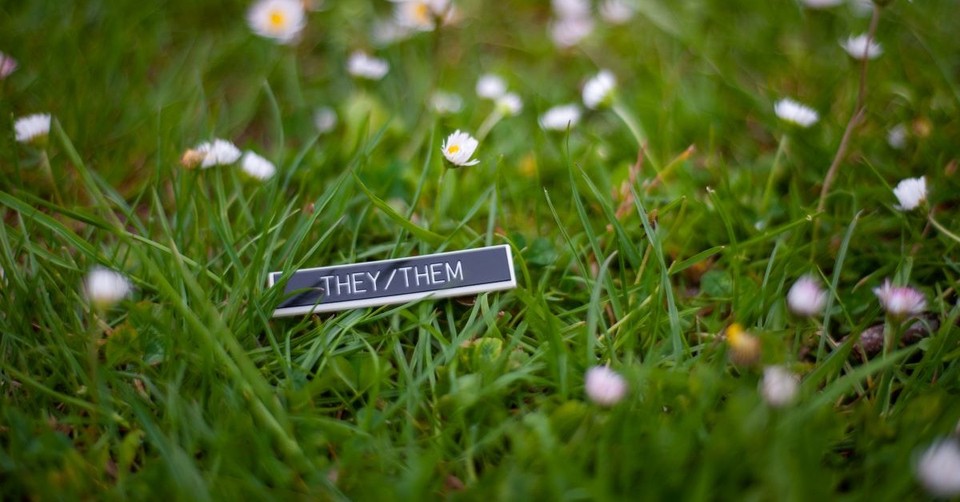Should Christians Use Gender Inclusive Pronouns?

Gender inclusive pronouns are not a recent phenomenon, but they have become a leading character in language today. It has now become important to society that we ask what a person’s pronouns are upon meeting them. This is where the debate between Christians begins.
For ultra-conservative and conservative Christians, using a pronoun that does not pair with your biological gender is unacceptable. More liberal Christians don’t see the pronoun war important. The use of gender inclusive pronouns may not be an issue you ever saw coming, but it is here, and we need God’s wisdom to wade through it.
Christians strive to live a life that exudes Christ, but what is the right way to address pronoun usage? Should Christians use gender inclusive pronouns to refer to a person’s gender identity?
Basics of Pronouns
The best way to start this discussion is to identify what a pronoun is and how they are used. Pronouns are words that take the place of a noun. The most used pronouns are he/she, it, someone, or they. A pronoun can be a person, subject, or object.
Our quick English lesson has taught us what a pronoun is, but what about pronouns referring to gender? This is where things can get confusing. Pronouns relating to people who refer to themselves as male or female are he/him and she/her. Other pronouns like they/them refer to gender identities, including non-binary, gender neutral, or gender nonconforming.
How is Gender Determined?
Most of you are probably thinking, duh, we know how gender is determined. For as long as mankind has existed, gender was determined at birth based on the genitalia of the baby. One type was male, and the other was female. For now, doctors are still determining gender in this fashion.
Beyond the traditional gender determination, is a new way to identify one’s gender. People who consider themselves transgender don’t identify with the gender given to them at birth. Non-binary people do not identify as male or female. They see gender as a spectrum. Gender fluid people feel they have both masculine and feminine qualities and will move from male to female in time or based on mood.
The secular society determines gender based upon how a person feels. It is about self-expression and self-love. People are searching for the best way to express who they truly are, and gender is one of the chosen ways.
Two Sides of the Argument
Along with gender identity comes the use of gender inclusive pronouns. As I stated in my introduction, there is a debate among Christians whether or not they should use pronouns. There are those who say yes, those who say no, and those who believe the answer changes when situations change.
Who Says Yes?
The argument for using gender inclusive pronouns is based on respect and love. Christians on this side believe that choosing to not use the proper pronouns exudes hate for humankind. They want to show that Christ loves all people by using the pronouns preferred and respecting others.
Who Says No?
Christians totally opposed to using gender inclusive pronouns use the argument that to use the pronoun you are rejecting God. It is an open act of rebellion. God defines reality, not humans. In an article by Sam Parkinson, he suggests this argument is supported by a passage in 1 Corinthians 10:20-21. In this passage, Paul tells the Corinthians that they cannot drink the cup of the Lord and the cup of demons.
In essence, Christians who say no are saying that people are not allowed to determine their gender identity. Only God can determine that.
Who Says, “It Depends?”
This is where thoughts get a little hairy. Some will say if they are an unbeliever, we need to be respectful. Others would say if they have confessed Christ in their life, they should be called out. The thought processes are endless.
This leads us to the next phase of our discussion.
Should Christians Use Gender Inclusive Pronouns with Unbelievers?
Speaking with unbelievers is a form of evangelism. You don’t know how much knowledge they have of Scripture or who God is. In this situation, using their preferred pronouns could be a tool in building a relationship that will lead to sharing the good news of Christ.
Paul is a prime example of how to use communication with those who differ from us. In Acts 17:22-23, Paul is talking to the people at the meeting of the Areopagus. He tells them they are religious and that he sees their objects of worship. Did Paul agree with their religious worship? No! What Paul was doing was building a bridge that would lead to him saying in verse 23, “Now what you worship as something unknown, I am going to proclaim to you.”
Building a common ground with people goes a long way. It shows that you have your eyes open, and you are listening to them. This approach also keeps walls from being built. For some, it is a sign of respect.
The primary need for an unbeliever is Christ. As Christians, we need to be bold in our faith but at the same time show Christ to all we meet. We need to make every unbeliever we meet ask, “What is different about them? Why are they hopeful?”
Should Christians Use Gender Inclusive Pronouns with Believers?
As believers, we are all brothers and sisters in Christ. We have a responsibility to fellowship and encourage each other. We also have a responsibility to look out for one another.
The writer of Hebrews says to see that none of you has a sinful, unbelieving heart that turns you away from God. Accomplishing this task requires we confront sin within the body of Christ. In Matthew 18:15-18 we learn how we confront the sin of another believer and James tells us in chapter 5:19-20 why we should turn others away from sin.
In the case of gender inclusive pronouns with believers, we are called to speak to them about their sin. We are to treat them with respect and regard them as a brother.
Why Should Christians Be Concerned about Gender Inclusive Pronouns?
Christians are struggling with how to use pronouns and whether they should use them. In my research, I began thinking about why this topic was so important. Why should we be so concerned with a little word?
The answer I came up with is that no Christian wants to see anyone on the path to eternal fire. Sharing Christ with others is to share love with others. Love is gentle, kind, and patient. It isn’t rude or prideful. Paul said the greatest gift we could give someone is love.
Love is also truth. We cannot tell lies to others and say we love them. Does this mean we shout in their face all their sins? I don’t think so. I believe we can show love to others who are struggling with gender dysphoria or confusion because God is love.
I also believe that we can refer to people by name. When we meet new people, the first question after hello, should be what is your name; not what are your preferred pronouns? In Isaiah 43 and 45, God says he summons us by name, not by pronoun.
Final Thoughts
Whether or not Christians should use gender inclusive pronouns is a touchy subject. It is incredibly hard to come up with an exact answer. What we can say is that our Lord knows what is happening in a person’s life and He knows how we need to help them. We also know that God loves everyone, and we need to show that love to everyone we meet.
If we rely on God’s wisdom and His Word, we will always find the right answer.
Related Resource: A Prayer to Endure When Motherhood Is Hard
A prayer for the worn-out mother, based on 2 Thessalonians 3:13. Everyday Prayers with Million Praying Moms is dedicated to helping you learn to pray God's Word for your children in the areas they need it most. Be sure to subscribe to Everyday Prayers on Apple or Spotify to get every episode straight to your phone each day!
Photo Credit: ©Getty Images/Nicky Ebbage

Originally published June 23, 2021.




